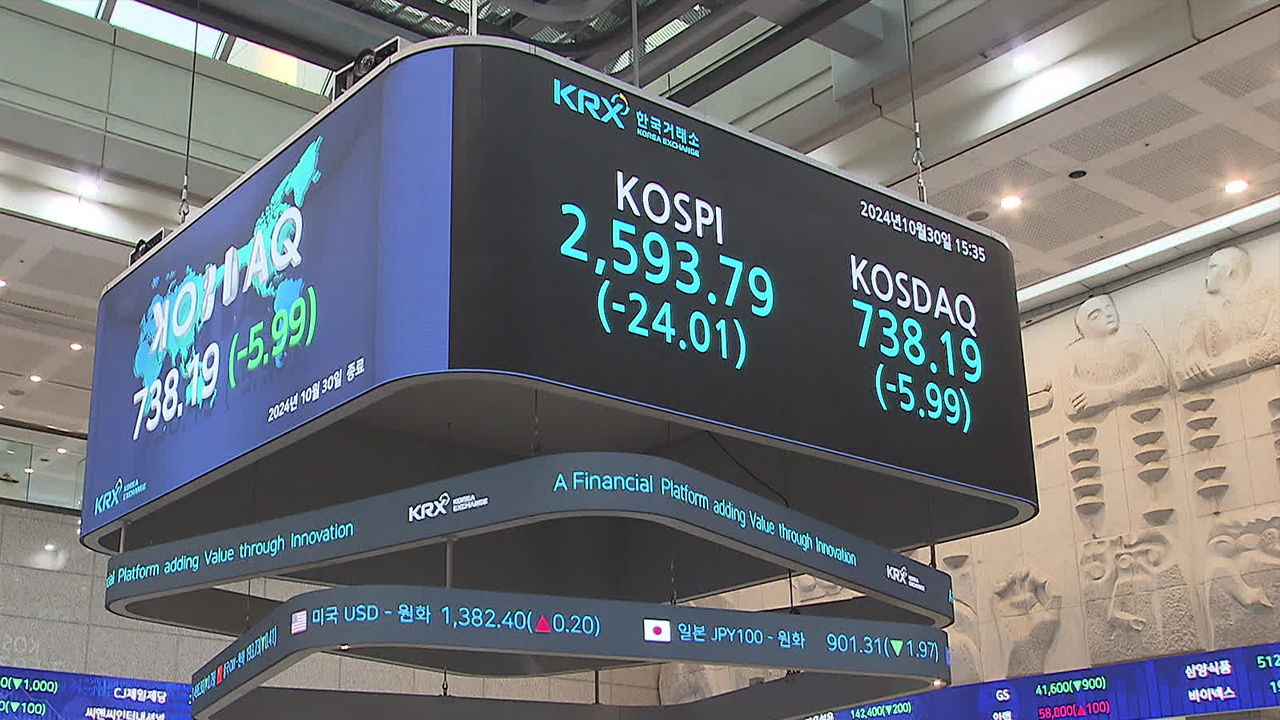Domestic stock market lags behind amid global surge
입력 2024.10.30 (23:46)
읽어주기 기능은 크롬기반의
브라우저에서만 사용하실 수 있습니다.
[Anchor]
While major countries' stock markets are soaring, why is our stock market lagging behind?
There are assessments that the conditions are less favorable compared to advanced countries' stock markets.
The sluggishness of the Chinese economy is also having an effect.
Next, we have reporter Hwang Kyung-joo.
[Report]
Last night, both intraday and closing prices of the U.S. Nasdaq index hit record highs.
This is due to increased expectations for the performance of big tech companies, including Alphabet, one of the M7 leading stocks driving the U.S. market.
The Japanese Nikkei index also recorded its highest level since July, reaching the highest point in 34 years since 1990.
In major countries like the U.S. with its 'M7' and Japan with its 'Samurai 7', the continuous rise in stock prices is largely due to a few large-cap stocks surging and driving the overall market.
In our stock market, where leading stocks are underperforming and there are no new standout stocks, phenomena like 'national stock escape' and 'investment immigration' are emerging.
[Park Sang-hyun/iM Securities Research Division Specialist: "(In major countries) strong companies themselves have driven the stock market, but it is actually difficult to select such leading stocks and strong companies in our country, which fundamentally reflects the limitations of our stock market...."]
The end of monetary tightening and the onset of interest rate cuts also present unfavorable factors compared to major countries' stock markets.
Since it is difficult to actively inject money compared to the dollar, euro, and yen, which are major currencies with high demand, the power to support the stock market with liquidity is inevitably dwindling.
[Kim Hak-kyun/Shinyoung Securities Research Center Director: "The German stock market has been continuously hitting record highs recently, but Germany's economy is expected to have negative growth this year. This is an effect of the large amount of money injected into the Eurozone benefiting the German stock market...."]
Given the high proportion of investments in China, concerns about China's economic downturn are also a burden on our stock market.
This is KBS News, Hwang Kyung-joo.
While major countries' stock markets are soaring, why is our stock market lagging behind?
There are assessments that the conditions are less favorable compared to advanced countries' stock markets.
The sluggishness of the Chinese economy is also having an effect.
Next, we have reporter Hwang Kyung-joo.
[Report]
Last night, both intraday and closing prices of the U.S. Nasdaq index hit record highs.
This is due to increased expectations for the performance of big tech companies, including Alphabet, one of the M7 leading stocks driving the U.S. market.
The Japanese Nikkei index also recorded its highest level since July, reaching the highest point in 34 years since 1990.
In major countries like the U.S. with its 'M7' and Japan with its 'Samurai 7', the continuous rise in stock prices is largely due to a few large-cap stocks surging and driving the overall market.
In our stock market, where leading stocks are underperforming and there are no new standout stocks, phenomena like 'national stock escape' and 'investment immigration' are emerging.
[Park Sang-hyun/iM Securities Research Division Specialist: "(In major countries) strong companies themselves have driven the stock market, but it is actually difficult to select such leading stocks and strong companies in our country, which fundamentally reflects the limitations of our stock market...."]
The end of monetary tightening and the onset of interest rate cuts also present unfavorable factors compared to major countries' stock markets.
Since it is difficult to actively inject money compared to the dollar, euro, and yen, which are major currencies with high demand, the power to support the stock market with liquidity is inevitably dwindling.
[Kim Hak-kyun/Shinyoung Securities Research Center Director: "The German stock market has been continuously hitting record highs recently, but Germany's economy is expected to have negative growth this year. This is an effect of the large amount of money injected into the Eurozone benefiting the German stock market...."]
Given the high proportion of investments in China, concerns about China's economic downturn are also a burden on our stock market.
This is KBS News, Hwang Kyung-joo.
■ 제보하기
▷ 카카오톡 : 'KBS제보' 검색, 채널 추가
▷ 전화 : 02-781-1234, 4444
▷ 이메일 : kbs1234@kbs.co.kr
▷ 유튜브, 네이버, 카카오에서도 KBS뉴스를 구독해주세요!
- Domestic stock market lags behind amid global surge
-
- 입력 2024-10-30 23:46:13

[Anchor]
While major countries' stock markets are soaring, why is our stock market lagging behind?
There are assessments that the conditions are less favorable compared to advanced countries' stock markets.
The sluggishness of the Chinese economy is also having an effect.
Next, we have reporter Hwang Kyung-joo.
[Report]
Last night, both intraday and closing prices of the U.S. Nasdaq index hit record highs.
This is due to increased expectations for the performance of big tech companies, including Alphabet, one of the M7 leading stocks driving the U.S. market.
The Japanese Nikkei index also recorded its highest level since July, reaching the highest point in 34 years since 1990.
In major countries like the U.S. with its 'M7' and Japan with its 'Samurai 7', the continuous rise in stock prices is largely due to a few large-cap stocks surging and driving the overall market.
In our stock market, where leading stocks are underperforming and there are no new standout stocks, phenomena like 'national stock escape' and 'investment immigration' are emerging.
[Park Sang-hyun/iM Securities Research Division Specialist: "(In major countries) strong companies themselves have driven the stock market, but it is actually difficult to select such leading stocks and strong companies in our country, which fundamentally reflects the limitations of our stock market...."]
The end of monetary tightening and the onset of interest rate cuts also present unfavorable factors compared to major countries' stock markets.
Since it is difficult to actively inject money compared to the dollar, euro, and yen, which are major currencies with high demand, the power to support the stock market with liquidity is inevitably dwindling.
[Kim Hak-kyun/Shinyoung Securities Research Center Director: "The German stock market has been continuously hitting record highs recently, but Germany's economy is expected to have negative growth this year. This is an effect of the large amount of money injected into the Eurozone benefiting the German stock market...."]
Given the high proportion of investments in China, concerns about China's economic downturn are also a burden on our stock market.
This is KBS News, Hwang Kyung-joo.
While major countries' stock markets are soaring, why is our stock market lagging behind?
There are assessments that the conditions are less favorable compared to advanced countries' stock markets.
The sluggishness of the Chinese economy is also having an effect.
Next, we have reporter Hwang Kyung-joo.
[Report]
Last night, both intraday and closing prices of the U.S. Nasdaq index hit record highs.
This is due to increased expectations for the performance of big tech companies, including Alphabet, one of the M7 leading stocks driving the U.S. market.
The Japanese Nikkei index also recorded its highest level since July, reaching the highest point in 34 years since 1990.
In major countries like the U.S. with its 'M7' and Japan with its 'Samurai 7', the continuous rise in stock prices is largely due to a few large-cap stocks surging and driving the overall market.
In our stock market, where leading stocks are underperforming and there are no new standout stocks, phenomena like 'national stock escape' and 'investment immigration' are emerging.
[Park Sang-hyun/iM Securities Research Division Specialist: "(In major countries) strong companies themselves have driven the stock market, but it is actually difficult to select such leading stocks and strong companies in our country, which fundamentally reflects the limitations of our stock market...."]
The end of monetary tightening and the onset of interest rate cuts also present unfavorable factors compared to major countries' stock markets.
Since it is difficult to actively inject money compared to the dollar, euro, and yen, which are major currencies with high demand, the power to support the stock market with liquidity is inevitably dwindling.
[Kim Hak-kyun/Shinyoung Securities Research Center Director: "The German stock market has been continuously hitting record highs recently, but Germany's economy is expected to have negative growth this year. This is an effect of the large amount of money injected into the Eurozone benefiting the German stock market...."]
Given the high proportion of investments in China, concerns about China's economic downturn are also a burden on our stock market.
This is KBS News, Hwang Kyung-joo.
-
-

황경주 기자 race@kbs.co.kr
황경주 기자의 기사 모음
-
이 기사가 좋으셨다면
-
좋아요
0
-
응원해요
0
-
후속 원해요
0















이 기사에 대한 의견을 남겨주세요.